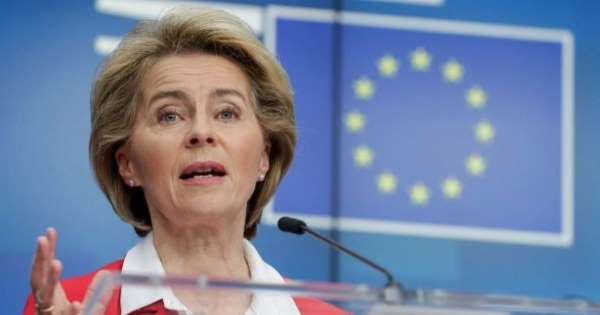What hides behind the European Bazooka?
The Recovery and Resilience Facility (RRF), popularly known as the “European Bazooka”, has been presented as the “lifeline” that will help solve the economic crisis triggered by the COVID-19 pandemic. But what is the RRF? Drawn up by the European Commission, the RRF is a mechanism for the financing of the economy, with a financial provision for a total of 672.5 billion euros (US$802 billion). Of this, 312.5 billion euros (US$372.5 billion) will be in “non-refundable” grants and 360 billion euros (US$429.5 billion) in loans to the countries that request them. According to the recovery and resilience plan recently submitted by the Portuguese Government, Portugal plans to access 13.9 billion euros (US$16.5 billion) in “non-refundable grants” and around 2.7 billion euros (US$3.2 billion) in loans. From the government to those on the right, many have praised the European Commission’s response to this crisis. Compared to the US plan to invest around 1.59 trillion euros (US$1.9 trillion) in its economy, we can see that the value of the “European bazooka” is insufficient. However, it is clear that there is a change in the EU’s response to this economic crisis compared to that of 2008. Where it previously focused on a recessive budgetary policy and was preoccupied with sovereign debt, this time around it seems to be going in a more economically expansionist direction. Nevertheless, care must be taken when it comes to this funding mechanism.
For one, almost a year has passed since the announcement of the European “bazooka”, and yet no money has arrived in any country. It seems that the more we get to know about the plan, the more we become aware of its limitations.
For example, the much-publicized “non-refundable” grants are now known to be conditional on the approval of the European Commission (EC), which continues to defend well-known neo-liberal recipes such as pension and labor market reform. Furthermore, as Left Bloc (BE) MEP José Gusmão spelled out in the “Público” newspaper podcast, these grants will turn into debt to be paid in the future. Along with this, the agreement also indicates that the budgetary austerity policy (Stability and Growth Pact – SGP), which was suspended a year ago due to the pandemic, will be applied again once the situation allows it. Finally, European funds will be chiefly invested in companies, and the newly “uberized” sectors in particular. The famous “digital transition” has a lot to do with the further development of work via platforms and ‘telework’ (working remotely) which we know that, without democratic workers’ control and the strengthening of labor laws, only means deregulation and precariousness, as we can see with those who work for Uber, Glovo (a Barcelona-based food delivery app) and in call centers. On the question of RRF support to business, Portuguese Prime Minister António Costa has already said that there will be 4.6 billion euros (US$5.5 billion) in direct aid, along with further indirect aid. This will see other parts of the economy, such as the cultural sector which has been greatly affected by the pandemic, abandoned when it comes to any kind of aid and funding.
What kind of plan is needed for those at the bottom?
What is really needed is a social bazooka, one that addresses the tremendous crisis being experienced by the working class, and its most oppressed and exploited sectors in particular. A bazooka that keeps the needs of the working class in mind, and not those of the companies, the multimillionaires, and the powerful.
Such a plan must take into account the climate crisis and respond with concrete measures. It needs to finance climate jobs, that is, the establishment of public services and thousands of decent and socially useful jobs to combat the climate crisis. Effectively investing in railways rather than road or aviation, by renovating, upgrading, and building more railways, would generate more socially useful jobs and reduce greenhouse gas emissions. Some studies indicate that a socially just energy transition could generate 100,000 new jobs.
The health system must also be central. If there were ever any doubts, the pandemic has demonstrated the importance of public services, more specifically the importance of the National Health Service (SNS) over private health; it has shown that investment in the SNS is a necessity for both working-class access to free and quality health care and for professionals in this sector to be properly appreciated and valued. Serious investment is also urgently needed in education, with fewer students per class and hence more education professionals.
The pandemic has also revealed how women, especially those from racial minorities, have been the most affected. Not only because of the more precarious jobs they have, but also because of the domestic tasks and care that falls on their shoulders, which have been aggravated by lockdowns and school closures. The pandemic has also exposed the degrading situation in the nation’s homes. In this regard, we need a public network of crèches, public aged care facilities, laundries, and public restaurants to stop working women from being overburdened. At a time when racist and far-right ideas are gaining visibility in the world and in Portugal, there needs to be investment in a national plan to combat racism.
Given exorbitant housing and rental prices, especially in the big cities, this plan would have to give priority to affordable housing and the end of evictions. Housing is a right that is written into the constitution, but not applied in practice. The consequence is that the working class pays more and more to live further away from where they work, and further away from the cities in which they have more common interests.
As a product of the measures of the ‘troika’ (the European Commission, European Central Bank, and the IMF), it is the more precarious workers who have been most affected by the pandemic, especially those in the hotel, cultural, restaurant, and tourism sectors. A plan is needed to ensure that no rights are cut and that the pre-Troika labour laws from before 2011 are restored. Support is needed for all workers in the most affected sectors to guarantee them a basic income during the pandemic.
For these measures to occur, the money must be taken from where it is. We will not permit the crisis to be once again paid for by the 99% and the planet. No more aid to the same people as always: big business and the polluting companies. No more turning a blind eye to those who have profited from the pandemic crisis, such as the multimillionaire owners of Amazon, Facebook, Google, and the pharmaceutical corporations. It is time to tax the multimillionaires and the great fortunes; the rich must pay for the crisis so that an egalitarian redistribution of wealth can begin.
This article is an English translation of ““Bazuca” Europeia: o que é e o que precisamos?”, Semear o Futuro (SoF), 09/03/2021.
Translation: Bobby Sparks




Comentários